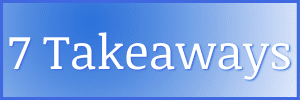Understanding loneliness. Is it really luck? The power of just listening. Keeping your faith in humanity. Unnecessary constraints. Offense as a means to control. Whatever it is, learn from it.

(If you’re having difficulty viewing this email, visit 7takeaways.com/latest in your browser. If a link to a source below leads to you a paywall or is otherwise inaccessible, please read my note on the topic: Paywalls.)
If someone forwarded you this email, you can subscribe at 7takeaways.com.
1. “The end of loneliness is understanding”
Loneliness: the final taboo? – Annie Scott – (Midlife Mess with Annie Scott newsletter)
An interesting perspective on loneliness: that‘s something still taboo for discussion. And yet it’s important to talk about, as it seems a growing epidemic.
… spending time seeing and knowing others is a wonderful thing to do. I have a personal theory it’s what we’re put on this world to do.
It’s something I feel takes an extra effort of late, for a variety of reasons. And so important.
Do this: Remember: “Life is too short to not make time for the people who matter to us.”
Support 7 Takeaways
(Or just forward this to a friend.)
2. “A 56-year-old dressing like a teenager and expecting to be cool”
Lucky vs. Repeatable – Morgan Housel – (Collab Fund blog)
I’ve written about luck before. I view it as being prepared and open to opportunities that present themselves. Housel gives an additional perspective.
Lucky implies random events you could not see coming. What isn’t repeatable is different.
That being said, learning from the examples of others and identifying what was repeatable can also be luck … if you elect to act on it.
History is the study of change, ironically used as a map of the future.
Distinguishing between the repeatable and the random is how you leverage that information.
Do this: Look for both.
3. “Silence is golden”
Zip Your Lips and Other Tips for Adulting Like a Pro – Sarah Knight – (No F*cks Given newsletter)
Honestly, this is one of the hardest things to do:
… grownups? They’ve perfected the silent treatment: they don’t interrupt; they listen when others are speaking; sit still when people are performing; and zip their lips when Auntie Sarah is clearly pausing for effect and not looking for input from the crowd.
Another theme that seems to emerge from my reading is listening. It’s hard when we’re convinced our potential contribution is So Very Important (spoiler: it’s not). Only by focusing and practicing our listening skills — and by extension our shutting-up skills — can we improve. Bonus: we’ll learn so much more from those we listen to.
Do this: Zip your lips and listen.
4. “Your faith in humanity might wobble”
7 ways to keep loving humanity, even in troubled times – Susan Cain – (The Quiet Life newsletter)
No matter how much I try to remind myself of positive news. it’s getting harder and harder to have faith in humanity. Cain offers a reminder that the other side really exists.
And then, you come across a single human who has produced a beautiful idea, who has performed a beautiful act, who has embodied great love. And you remember that humans are this, too.
She then also presents a list of things to consider, and philosophies to reflect on, to perhaps counter the depression. None will be new to you, but they serve as good reminders. We’re certainly not thinking of them enough of late.
Do this: Remember “This too shall pass.”
5. “You thought yourself into a dead end”
The goose in the bottle – Oliver Burkeman – (The Imperfectionist newsletter)
Burkeman explores how we so often accept, or even make-up, non-existent constraints limiting our ability to solve a problem or produce a result. “The goose in the bottle” is one such thought exercise (that I won’t spoil for you, other than to say it’s both simple and slightly aggravating).
… many of the barriers we experience, in our efforts to use our time fulfillingly and well … arise from unspoken frameworks of belief that we actively maintain in our lives
I think the important takeaway is not the constraints we assume in our workplace or other task-oriented environment, but the assumptions we make about life itself, known as “belief systems”. As we’ve seen in recent years, it’s almost impossible to get people to look outside their belief systems in order to solve a problem, or even just to be what others might consider a decent human being.
Do this: Question your constraints. All of them.
6. “Words are valves that relieve the pressure cooker of the brain”
Censoring offensive language threatens our freedom to think – Paul Ham – (Psyche)
I almost didn’t include (or even finish) this essay because it went very academic very quickly. Fortunately, it stuck the landing with some excellent points.
.. those who presume to ban or delete texts they find offensive threaten a lot more than our right to free speech. They menace the freedom to think. They proceed on the ridiculous assumption that if they eradicate offensive language, they’ll eradicate offensive people.
This applies as equally to words — the starting point of the essay — as well as collections of words, aka books, some find “offensive”. While there is an important distinction, in my mind — words are tools we use to express ideas clearly, collections of words are those ideas — the conclusion is the same. The offended, in attempting to ban words or books, are attempting to control how and what we think, and indeed, who we are. That’s simply not acceptable in a free and open society.
Do this: Think twice before choosing to be offended. (It is a choice, after all.)
7. “Consider the Possibility that Everything I’ve Written is BS”
46 Reflections on a Life Half Over – Srinivas Rao – (Unmistakable Creative blog)
Yes, it’s a listicle, but it’s a listicle with some meat on it. Written mostly as a reminder to himself, it’s a good list of ideas to at least consider.
44. Learn from Whatever Happens
Just like everyone we ever meet can teach us something, every experience in life can teach us something. My first job in high school was working at McDonald’s, and it sucked. But it taught me some useful lessons.
This was among the items that caught my eye. We spend so much time trying to get out of bad situations, or make things we don’t like stop, that we fail to take a beat and reflect on exactly what we can learn, from how we got there, to how we coped, to how we ended it, and what we might have done differently. We’re too busy to pause, and instead hurry to move on to the next thing.
Do this: Pause. Learn. (The entire list is worth a few moments, even if only to skim.)
What I’m Reading
In progress:
- Magic Shifts – Ilona Andrews
- Grow the F*ck Up: How to Be an Adult and Get Treated Like One – Sarah Knight
- Supercommunicators: How to Unlock the Secret Language of Connection – Charles Duhigg
- The Problems Of Philosophy – Bertrand Russell
- Feel-Good Productivity: How to Do More of What Matters to You – Ali Abdaal
- The Odyssey – Homer (Audio)
Daily:
- A Calendar of Wisdom: Daily Thoughts to Nourish the Soul, Written and Selected from the World’s Sacred Texts – Leo Tolstoy
A full list of my common sources is on the sources page.
Support 7 Takeaways
As Austin Kleon says about his own newsletter: it’s free, but not cheap. Your support helps keep 7 Takeaways viable. I appreciate your consideration VERY much.
I have options for recurring Support (Monthly/Quarterly/Yearly options) as well as one-time support over in The Ask Leo! (my “day job”) store.
Another thing that really helps is sharing 7 Takeaways with a friend. Just forward this email on. And if you received this email from a friend, you can subscribe at 7takeaways.com to get your own copy every Sunday.
Thanks!
-Leo

Thank you Leo. This edition presents me with 7 items I wish to read / study. There’s a first time for everything – or is there? Better find an article on that.
Chris.